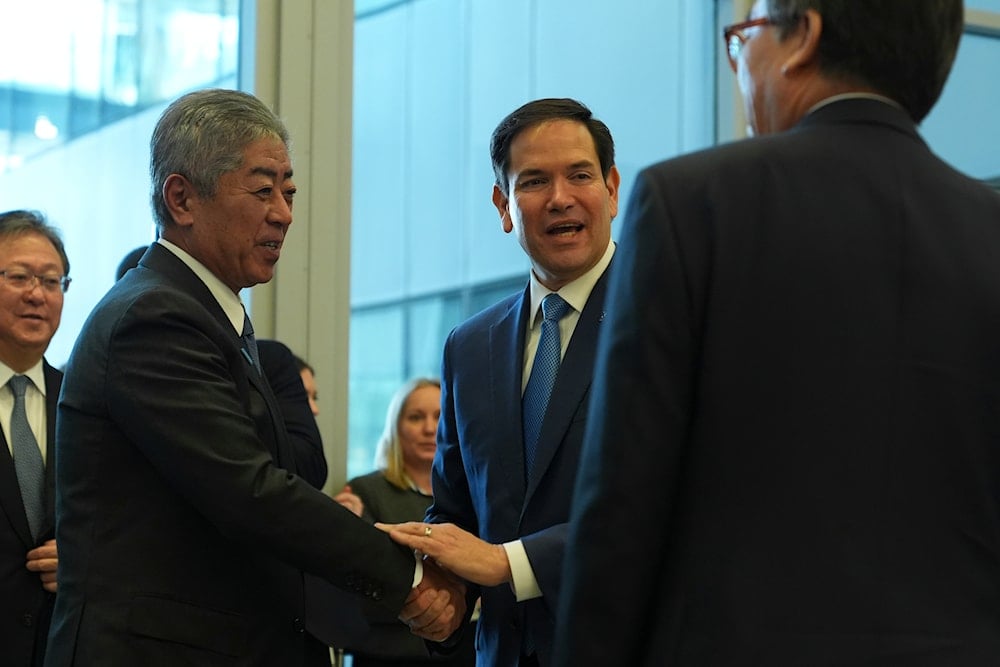Nearly 70% of Japanese want foreign policy independent of US: Poll
A recent Asahi Shimbun poll reveals that nearly 70% of Japanese citizens favor a more independent foreign policy from the US, with growing skepticism about Washington's role in global peace and defense.
-

US Secretary of State Marco Rubio, right, shakes hands with Japan's Foreign Minister Takeshi Iwaya, left, as South Korea's Foreign Minister Cho Tae-yul, foreground, looks on, on the sidelines of a NATO foreign ministers meeting at NATO headquarters in Brussels, Thursday, April 3, 2025. (AP Photo/Jacquelyn Martin, Pool)
According to a poll published Sunday by the Asahi Shimbun newspaper, nearly 70% of Japanese citizens support the idea that the country should conduct its foreign policy more independently from the United States. The findings reflect a growing desire within Japan to establish a foreign policy stance that prioritizes national interests over alignment with Washington.
While 24% of respondents stated that Japan should continue to follow the US in its diplomatic efforts, a significant 68% indicated a preference for a foreign policy that is "as independent as possible." This highlights a shift in public sentiment regarding Japan-US relations, with many favoring a more autonomous approach.
The poll also revealed widespread skepticism about the ability of the US to maintain global peace.
When asked to what extent the international community can trust Washington in this role, only 3% of respondents said "a great deal," while 40% expressed "some" trust.
Conversely, 48% stated that the US cannot be trusted a great deal, and 6% believe it cannot be trusted at all. These figures point to declining confidence in US global trust, especially in light of ongoing international tensions.
Skepticism toward US commitment to defend Japan
Concerns about US-Japan defense alliance commitments were also evident. Only 15% of respondents believe the US would defend Japan if necessary, while 77% remain doubtful. Additionally, 90% expressed that Washington "cannot be relied upon" to ensure Japan’s defense.
This skepticism suggests that many Japanese citizens question the reliability of their country's security arrangements with the US, reinforcing calls for greater Japanese independence in US policy-making.
The Asahi Shimbun conducted the poll by mail between late February and early April, surveying 1,899 eligible voters. The results offer a snapshot of current public opinion, revealing significant shifts in attitudes toward Japan-US relations and Washington's influence on Japan's foreign and defense policies.
Outrage in Japan sparks rallies against sexual assault by US troops
This comes two days after rallies were held in Okinawa, Japan's southernmost prefecture, and Tokyo to condemn sexual attacks on girls and women by the US military stationed there.
The demonstrations occurred as two US marines in Okinawa are under investigation for rape accusations, the latest in a series of assaults angering locals on the island, home to most of Japan's 54,000 US troops.
"A US marine in his 20s is suspected of raping a Japanese woman at an American military base in March, and is also suspected of injuring another woman," a local police official told the Agence-France Presse (AFP).
The second marine, who is also in his 20s, is suspected of raping a Japanese woman at a US military base in January, according to an official familiar with the matter. Both cases involving the marines have now been formally referred to prosecutors for further legal action. In response to the investigations, US Ambassador George Glass stated that Washington will "fully" cooperate with Japanese authorities to ensure that justice is served per the law.
"We deeply value the ties of trust and friendship we have built over many decades with our Japanese hosts, and I am committed to doing everything I can to prevent actions that may jeopardise these bonds," he said in a statement.

 3 Min Read
3 Min Read









